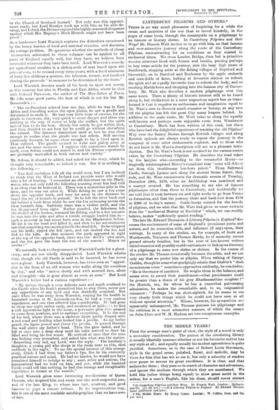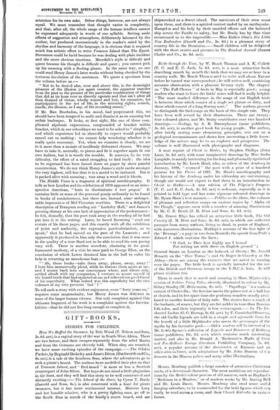THE MIDDLE YEARS.?
FROM the average man's point of view, the style of a novel is only a secondary consideration. The patron of the circulating library is venally blieefully unaware whether or not his favourite author has any style at all ; and equally usually his modest agnosticism is quite justified. Sometimes, as in the ease of Robert Louis Stevenson, style in the grand sense, polished, fluent, and melodic, may be there for him that has wit to see it, but only a minority of readers ever pause to savour its great excellence. It is clear; and that eufficeefor them ; they peas on in search of character and adventure, and ignore the medium through which they are manifested. We hold this (other things being equal) to show great merit in the writer, for a man's English, like his dress, should never attract • (I) CoMerbury Parifll• and WO Ways. By Francis Watt. London Methuen. and 47o. 17s. Od. ur9.1--4*A Literary 'Vargas In Rnplani. BT Talmwd Thomas. Same pob119hen and Flee.
y no Middle Yeera. By Henry James. Loader. ; W. Collins, Sons, and CO. 15s. net.] attention for its own sake. Other things, however, are not always equal. We must remember that thought varies in complexity, and that, after all, the whole range of the human intellect cannot be expressed adequately in words of one syllable. Setting aside effects of suggestion and atmosphere, deliberately laboured by the author, but produced unconsciously in the reader's mind by the rhythm and harmony of the language, it is obvious that it required much less artistic effort to write Treasure Island than The Egoist. Stevenson could be lucid because he was dealing with plain incident and the more obvious emotions. Meredith's style is difficult and queer because his thought is difficult and queer ; you cannot pick up his meaning with a fleeting glance. In the same way, no one could read Henry James's later works without being checked by the tortuous involution of the sentences. We quote a specimen from the volume before us Not to be denied also, over and above this, is the downright pleasure of the illusion yet again created, the apparent transfer from the past to the present of the particular combination of things that did at its hour ever so directly operate and that isn't after all then drained of virtue, wholly wasted and lost, for sensation, for participation in the act of life, in the attesting sights, sounds, smells, the illusion, as I say, of the recording senses."
If Mr. Max Beerbohm, in his mood, had perpetrated this, we should have been tempted to smile and dismiss it as on amusing but unfair burlesque. It looks, at first sight, like one of those com- plicated algebraic expressions, compounded of bracket within bracket, which in our schooldays we used to be asked to " simplify," and which experience led us shrewdly to expect would probably cancel out to nothing : wo cannot help wondering whether it is really quite necessary. Yet, when we examine it closely, we see in it more than a mosaic of needlessly dislocated clauses. We may have to take it, mentally, to pieces and fit it together again in our own fashion, but it is worth the trouble. It conveys, by its very difficulty, the effort of a mind struggling to find itself the idea to be expressed has been forced down on paper by sheer painful construction. We do not think Henry James's style ranks amongst the very highest, still less that it is a model to be imitated. But it is packed alive with meaning ; tear away a word and it bleeds.
The Middle Years is a fragment of spiritual autobiography. It tells us how London and its celebrities of 1870 appeared to an intro- spective American, " bom to discriminate d tout propos.' It contains little or none of the personal gossip ordinarily to be found in books of reminiscences, but there are, instead, some unforget- table impressions of Mid-Victorian worthies. There is a delighthd description of Tennyson reading out " Lockaley Hall," and James's growing dismay at his own lack of appreciation of the performance : he felt, dismally, that the poet took away in the reading all he had put into it in the writing. Later, be heard Browning " read out certain of his finest pages, and this exactly with all the exhibition of point and authority, the expressive particularisation, so to speak," that he had missed on the part of the Laureate ; and apparently it produced in him only the conviction that it was more in the quality of a true Bard not to be able to read his own poetry very well. There is another anecdote, charming in its good- humoured modesty, of a visit he once paid to George Eliot, on the conclusion of which Lewes detained him in the hall to enlist his help in returning an unwelcome loan " ' Ah, those books—take them away, please, away, away I' I hear him unreservedly plead, while he thrusts them again at me, and I scurry back into our conveyance whore, and where only, settled afresh with my companion, I venture to assure myself of the horrid truth that had squinted at me as T relieved our good friend of his superfluity. What indeed was this superfluity but the two volumes of my own precious ' last ' 1 "
To tell such a story with evident enjoyment, even " forty years on," requires some magnanimity, but Henry James was deficient in none of the larger human virtues. Our only complaint against this ultimate fragment of his work is a complaint against the Inevita- bilities—that he did not live long enough to complete it.















































 Previous page
Previous page